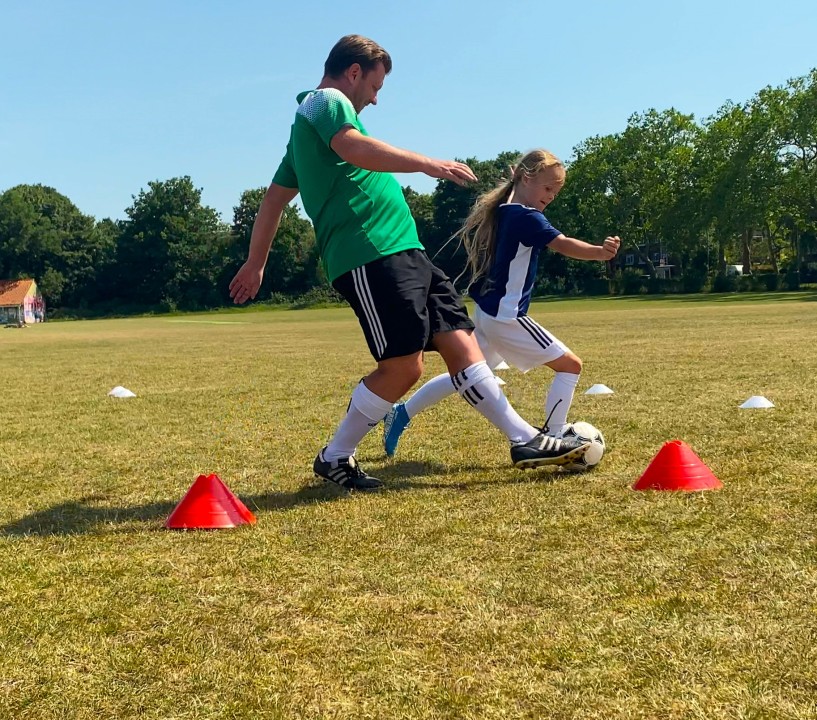
Since the COVID-19 pandemic, in 2020, childhood obesity levels have become a major concern in the UK.
Inactivity has, understandably, become embedded in some children's routines and they are less inclined to spend time outdoors. In fact, according to a recent report in the Guardian, almost 1 in 4 children are obese when they leave primary school 1.
So how can we reintroduce a more active and healthy lifestyle for our kids?
Starting Football is one way, and the Family F.C. app is designed to make the process as easy AND fun as possible for parents and kids alike.
An Hour A Day Keeps The Doctor Away
The World Health Organisation recommends that children aged 5 and upwards, undertake at least 60 minutes of vigorous exercise daily to stay healthy. 2
By participating in activities that increase their heart rate, they strengthen muscles and bones and reduce their risk of developing health conditions such as diabetes and heart disease. 3
For all you busy parents out there, don’t worry, the time can be spread throughout the day which also helps limit the time children are sitting or lying down.
It is not only sport that counts as exercise either - activities like walking to school, playing games outside with friends or even joining you for the daily dog walk all contribute towards their hour.
So, How About Football?
Football is a fantastic workout for children, with a perfect mix of aerobic and anaerobic exercises that strengthen muscles, improve fitness and assist with controlling weight.
Aerobic exercise involves using oxygen stored in your body, causing your heart rate to increase and deepening your breaths to replace the lost oxygen. 4 Prolonged periods of movement throughout a football match, including running, jumping and walking are all considered aerobic and help fortify your cardiovascular system.
Anaerobic on the other hand is a high-intensity exercise that uses energy already stored in your muscles. Therefore, anaerobic exercise is generally performed over 10-15 second periods. 5 Sprinting and dribbling are two examples of high-intensity bursts when playing football which builds muscle.
Both forms of exercise make Football a superb deterrent for obesity in Children.
Time For Dinner!
How many times as a kid do you remember your parents having to call you in because it was getting too late?
When you were playing outside it felt like you had unlimited energy!
Football while providing incredible health benefits, also helps with mental well-being which is equally important. Having fun, learning new skills and bonding can have a huge impact on a child’s self-esteem and confidence which in turn means they will have more energy and be more inclined to exercise.
Tackling The Problem Together
We aim to help reduce childhood obesity levels by encouraging more time outdoors.
With Family F.C. you have a fun, user-friendly app that guides you on teaching your children football while removing the pressure of planning each session yourself.
Transform a kick-around in the park, and kick off a new active and health-friendly hobby for your family.
Learning the beautiful game doesn’t get much better than that! Download the app today at familyfc.com
Works Cited
Gregory, Andrew. “Almost a quarter of English children are obese at the end of primary school.” The Guardian, 24 January 2024, https://www.theguardian.com/society/2024/jan/24/child-obesity-in-england-still-above-pre-pandemic-levels-study-finds. Accessed 3 May 2024.
“Physical activity.” World Health Organization (WHO), 5 October 2022, https://www.who.int/news-room/fact-sheets/detail/physical-activity. Accessed 3 May 2024.
“Physical Activity Facts | Healthy Schools | CDC.” Centers for Disease Control and Prevention, https://www.cdc.gov/healthyschools/physicalactivity/facts.htm. Accessed 3 May 2024.
Wheeler, Tyler. “Aerobic vs. Anaerobic Exercise: What's the Difference?” WebMD, 18 July 2023, https://www.webmd.com/fitness-exercise/difference-between-aerobic-and-anaerobic-exercise. Accessed 6 May 2024.